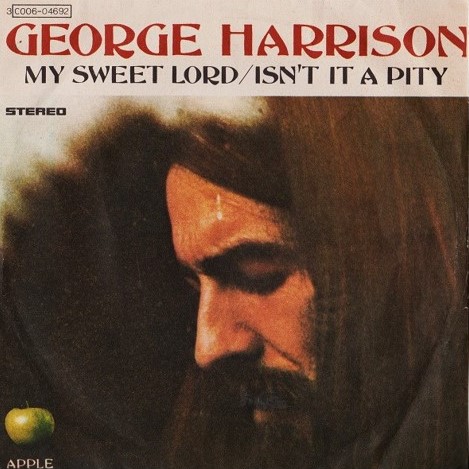It’s hard to believe today is the final Wednesday of 2023. I hope everybody is feeling groovy. For the last time this year, welcome to my weekly feature, where I take a closer look at a song I’ve only mentioned in passing or not covered at all to date.
If you’ve visited this blog before or are aware of my music taste otherwise, you know The Beatles are my all-time favorite band. I also like a good deal of each member’s solo work and have featured them and the band on many other occasions but not in Song Musings except for John Lennon.
Today, I’d like to turn to George Harrison. While he had become a seasoned writer by the mid-’60s, many of the songs he presented to The Beatles were rejected by Lennon and Paul McCartney. My pick was one of them. Ironically, it’s titled Isn’t It a Pity.
Harrison wrote Isn’t It a Pity in 1966 and proposed it for inclusion on a Beatles album various times, including the Get Back sessions that resulted in Let It Be, as well as The Beatles (White Album), Sgt. Pepper’s Lonely Hearts Club Band and Revolver. Like many other such songs it ended up on All Things Must Pass, Harrison’s massive first solo album after the break-up of The Beatles and his third overall.
“‘Isn’t It a Pity’ is about whenever a relationship hits a down point,” Harrison explained in his 1980 biography I, Me, Mine. “Instead of whatever other people do (like breaking each other’s jaws) I wrote a song. It was a chance to realize that if I felt somebody had let me down, then there’s a good chance I was letting someone else down. We all tend to break each other’s hearts, taking and not giving back – isn’t it a pity.”
Isn’t It a Pity, paired with My Sweet Lord, was released as a double A-side lead single on November 23, 1970, four days prior to the All Things Must Pass album. In the UK, My Sweet Lord was paired with What Is Life. The single became a massive hit worldwide, topping the charts in the U.S.; Canada; various European countries, including the UK, Republic of Ireland, Germany, Switzerland, The Netherlands, Norway and Sweden; as well as Australia.
It also became Harrison’s best-selling single, reaching Platinum status in the U.S. and the UK, and 2x Platinum in Japan. In the mid-’70s, that success got him into trouble with My Sweet Lord, and he was found guilty for subconsciously having plagiarized Ronnie Mack’s He’s So Fine, a 1963 hit for The Chiffons. Going back to Japan, here’s a live version of Isn’t It a Pity, captured there in 1991 during Harrison’s tour with his friend Eric Clapton. While it’s a pity the video is blurry, the audio is pretty good!
Co-produced by Harrison and Phil Spector, Isn’t It a Pity included a remarkable amount of high profile musicians: Tony Ashton (piano); Billy Preston (piano); Gary Wright (electric piano); Bobby Whitlock (harmonium), of Derek and the Dominoes; Badfinger’s Pete Ham, Tom Evans and Joey Molland (each acoustic guitar) and Mike Gibbins (tambourine); Klaus Voormann (bass); and Ringo Starr (drums). In addition to providing slide guitar and vocals, Harrison played acoustic guitar and Moog synthesizer. Orchestral and choral arrangements were done by John Barham. All of this creates a lush wall of sound, but I think it works magnificently for this song!
One of the things I absolutely love about Isn’t It a Pity is Harrison’s distinct slide guitar – a true signature sound. Apart from melodic playing and overdubbed harmony action, the soft tone is outstanding. The latter likely resulted from Harrison using his thumb instead of a pick. It’s also part of the equation for Jeff Beck’s magic tone.
In addition to the famous long 7:10-minute version, All Things Must Pass includes a shorter edit, Isn’t It a Pity (Version 2). At 4:48 minutes, this cut isn’t only significantly shorter but also noticeably slower. Apparently, Harrison initially wasn’t happy with the long version. The shorter version is said to have come about by chance on a separate occasion after one of the backing musicians began playing the song.
Taking a look at the credits for version 2 reveals the following: George Harrison (vocals, acoustic guitar), Eric Clapton (electric guitar), Tony Ashton (piano), Bobby Whitlock (organ), Carl Radle (bass), Ringo Starr (drums), Mike Gibbins (tambourine) and John Barnham (woodwind arrangement). It’s a more subdued cut, but I like it as well.
Isn’t It a Pity has been covered by many other artists, including Matt Monro, Nina Simone, Cowboy Junkies, Annie Lennox and Peter Frampton, among others. The songs was also performed during the commemorative Concert For George on November 29, 2002 by Eric Clapton and Billy Preston who were backed by a large band that included Jeff Lynne and Harrison’s son Dhani Harrison.
I’m leaving you with three of the above renditions, as well as the lyrics.
Isn’t It a Pity
Isn’t it a pity
Now, isn’t it a shame
How we break each other’s hearts
And cause each other pain
How we take each other’s love
Without thinking anymore
Forgetting to give back
Isn’t it a pity
Some things take so long
But how do I explain
When not too many people
Can see we’re all the same
And because of all their tears
Their eyes can’t hope to see
The beauty that surrounds them
Isn’t it a pity
Isn’t it a pity
Isn’t is a shame
How we break each other’s hearts
And cause each other pain
How we take each other’s love
Without thinking anymore
Forgetting to give back
Isn’t it a pity
Forgetting to give back
Isn’t it a pity
Forgetting to give back
Now, isn’t it a pity
[Repeat: x6]
What a pity
What a pity, pity, pity
What a pity
What a pity, pity, pity
Sources: Wikipedia; Songfacts; YouTube

